Back in the day, converter tools were the bread and butter of the internet for web developers. Analogous to the SAAS AI trend of today, they were easy to create and offered various niches and perspectives to harness. A breath of fresh air.
Then, they died. Not as relevant as before.
Maybe due to competition?
Well, here's the thing.
Converter tools are still one evergreen type of SAAS you can work on, provided you know how to burrow into any macro niche.
Helloo!
It's yet another Sunday. Welcome to SAAS Gap.
SaaS gap is a series on Dreamerbro where I share my research on market gaps weekly, a fancy word for markets with relatively higher odds for success and low competition. I do this with several research tools and techniques that lean more on the SEO side of things.
In today’s newsletter, we’ll be discussing converter tool ideas.
From simple to complex, as the spirit leads.
🚀One fun, easy project to build
Who would have thought you could make a product out of love or marriage?
There's a whole category of search queries, globally, around checking relationship compatibility in the form of a calculator.
A few of them include:
soulmate compatibility by date of birth - 3.3k
marriage compatibility by date of birth without time - 2.6k
zodiac compatibility calculator for marriage - 1.5k
moon phase compatibility calculator - 6k
numerology compatibility calculator - 6.7k
Funny, isn’t it?
Anyway, these queries are up for grabs. Low competition. Very few sites target them, or better put, target them specifically.
Targeting one of these keywords (or perhaps, digging deeper) alongside proper technical SEO can offer you an easy win.
This could also be a good inclusion product if you run a business around love or marriage or just looking to try something fun.
🔉Audio Converters
There are hundreds of search queries around audio converters, from MIDI converters to audio streaming services like Spotify.
However, one that caught my attention is the “YouTube MIDI converter.”
The primary search query for this gets 900 searches, with a few variants such as
youtube to midi converter - 900 searches
youtube to midi converter online - 650 searches
bear file converter youtube to midi - 60 searches
convert youtube to midi online - 70 searches
youtube to midi converter online free - 170 searches
This might be difficult to execute (to create a solution), technically speaking. However, there's a correlation between difficulty and success. So, maybe we're on the right track with this?
Barely three sites target the keyword “YouTube to MIDI converter” throughout Google, with the top-ranking site being a GitHub page (relatively easy to outrank).
There are also slight variants of this worth mentioning:
url to midi converter - 60 searches
best audio to midi converter - 380 searches
mp4 to midi - 1.6k searches
wav to midi - 2.6k searches
Now, if we move out of the MIDI converter niche for a second, we find that a lot of people want to convert their music from platform-restricted audio formats, like those used by YouTube Music, into raw audio.
…the rationale behind these queries:
bandlab mp3 converter - 170 searches
best spotify mp3 converter - 180 searches
bandlab to mp4 - 50 searches
For the first bandlab query, just one site does this…
And it's not just music per se. It extends to podcast platforms and other forms of audio-related fields, as well.
convert audible to mp3 free - 540 searches
scribd audiobook downloader - 490 searches
aax audio converter - 1.1k searches
rip audible files to mp3 - 170 searches
how to save a song as a file on iPhone - 160 searches
🤓Why I don’t use Keyword difficulty
If we only have two metrics in the SEO world, keyword difficulty is definitely going to be one of them. It’s as important as the search volume metric for most people.
“The lower the keyword difficulty, the higher the chances of ranking,” right?
Long story short, serious SEOs don't use keyword difficulty for nothing.
You remember the hair consultation niche I shared a few weeks ago? SEMrush reports it as having 0 KD.
This would be one of the easiest keywords you've ever come across if that were true.
But it's not.
You can't tell exactly how easy it is to rank for any keyword, and worse, programmatically using an algorithm. I doubt even Google can. You may only be able to tell manually with good SEO eyes.
This is basically the ability to skim the SERPs.
A keyword is most likely easy to conquer when…
Articles with different search intents rank at the top — this shows that the search intent is probably not yet satisfied and that Google is in its learning phase for such a keyword.
UGC content ranks at the top (this is now questionable due to how much precedence has been given to these types of sites over the last few algorithm changes).
Relatively new websites, age-wise, are present.
Sites with low domain authority are ranking.
There are generic pages, not specifically targeting the keyword, present.
There are more complex ways to handle this as well, especially when the keyword is a little competitive.
Now, don’t get me wrong.
Keyword difficulty can be useful as well.
For instance, they could come in handy when you know the mathematics behind how a keyword research tool calculates its keyword difficulty metric.
Notably, Ahref uses the number of backlinks of the top 10 ranking pages for a given keyword to calculate keyword difficulty.
With this, I know when a keyword has a difficulty of 20, the top-ranking pages have relatively few backlinks pointing to them.
If you use Ahref, you'll also have a short text noting “You need x number of domains to rank in the top 10.”
This can be helpful for a quick overview of the competition of keywords in terms of backlinks.
Not 100% accurate as well.
Ahref keyword difficulty metric is, however, the least complex approach you'd ever see.
Semrush, for instance, uses a variety of factors such as the median number of referring domains pointing to the URLs that are ranking, the median ratio of dofollow/nofollow links pointing to these, the median authority score of the domains that are ranking, and the SERP-related qualities of the keyword itself.
Obscurity at its peak.
I’m sure you don’t understand all that grammar. I don’t as well.
Simply put, only Semrush knows how they work out their keyword difficulty, so it may not be helpful in that regard.
Long story short: use keyword difficulty at your peril or a quick overview of search queries. They don’t represent actual search difficulties. Lastly, attempt to understand how the Seo tool you use calculates their keyword difficulty.
I should also point out that Semrush keyword difficulty is one of the best. Here’s an “aside“ case study on it.
💕 Whenever you are ready
Here are 4 ways I can help you:
Handle your SEO strategy
Offer an SEO-focused action plan for your SAAS
Find low-competition market gaps
Low competition keyword research service
Enjoyed This Newsletter?
Forward it to a friend, and let them know they can subscribe here.
See you next Sunday 🗓️
Until then,
Emmanuel Sunday







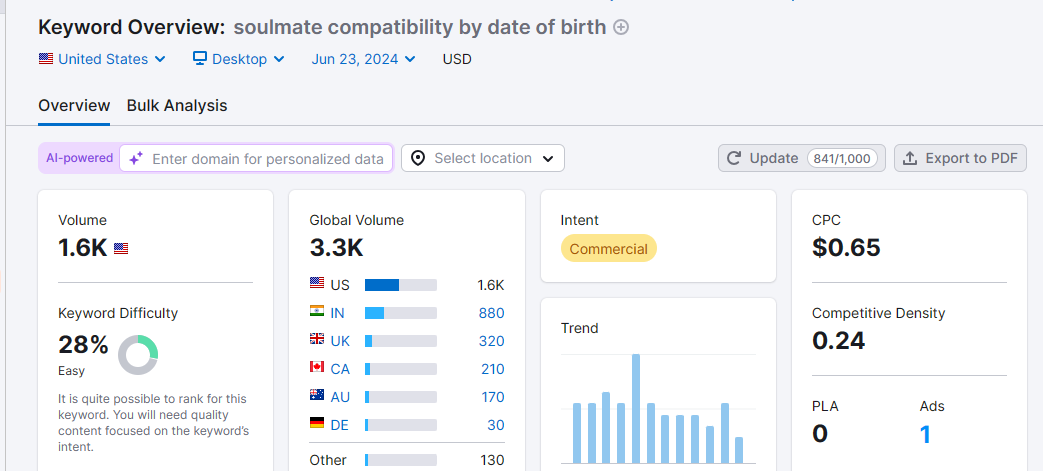
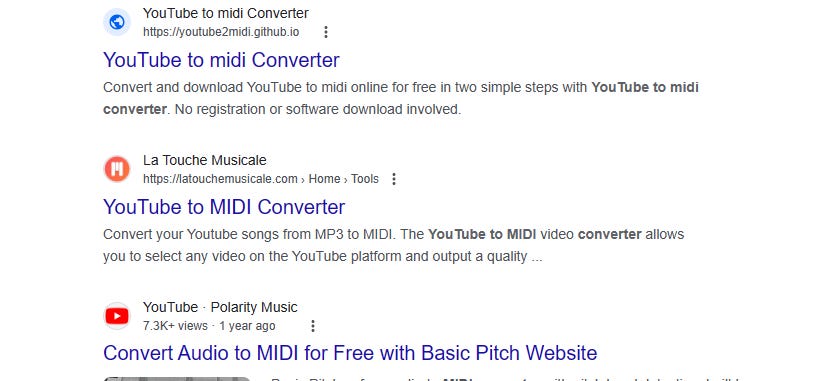
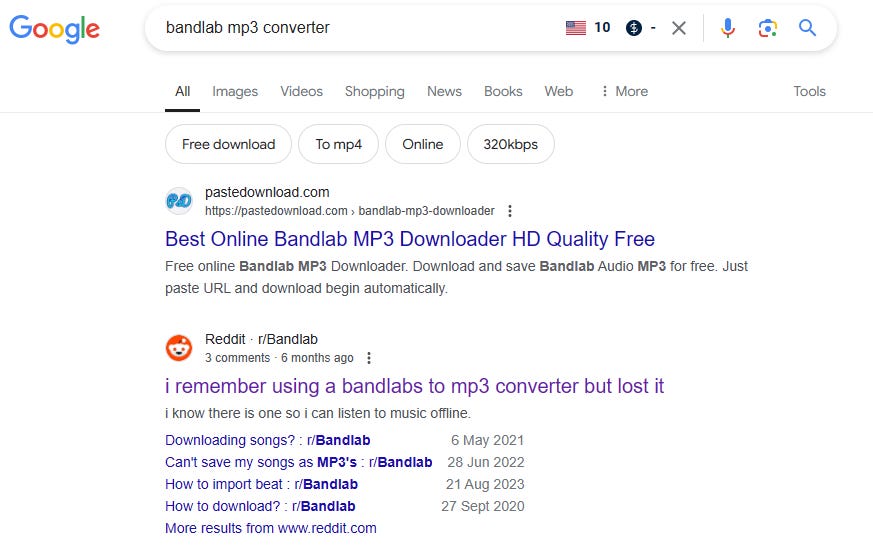
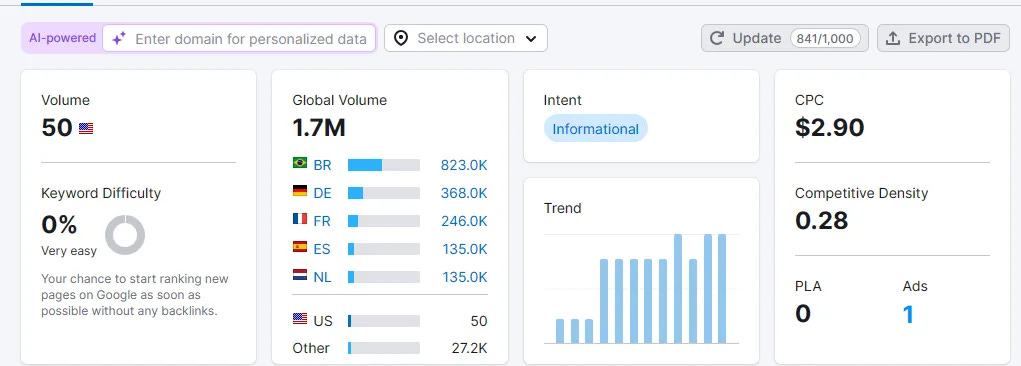
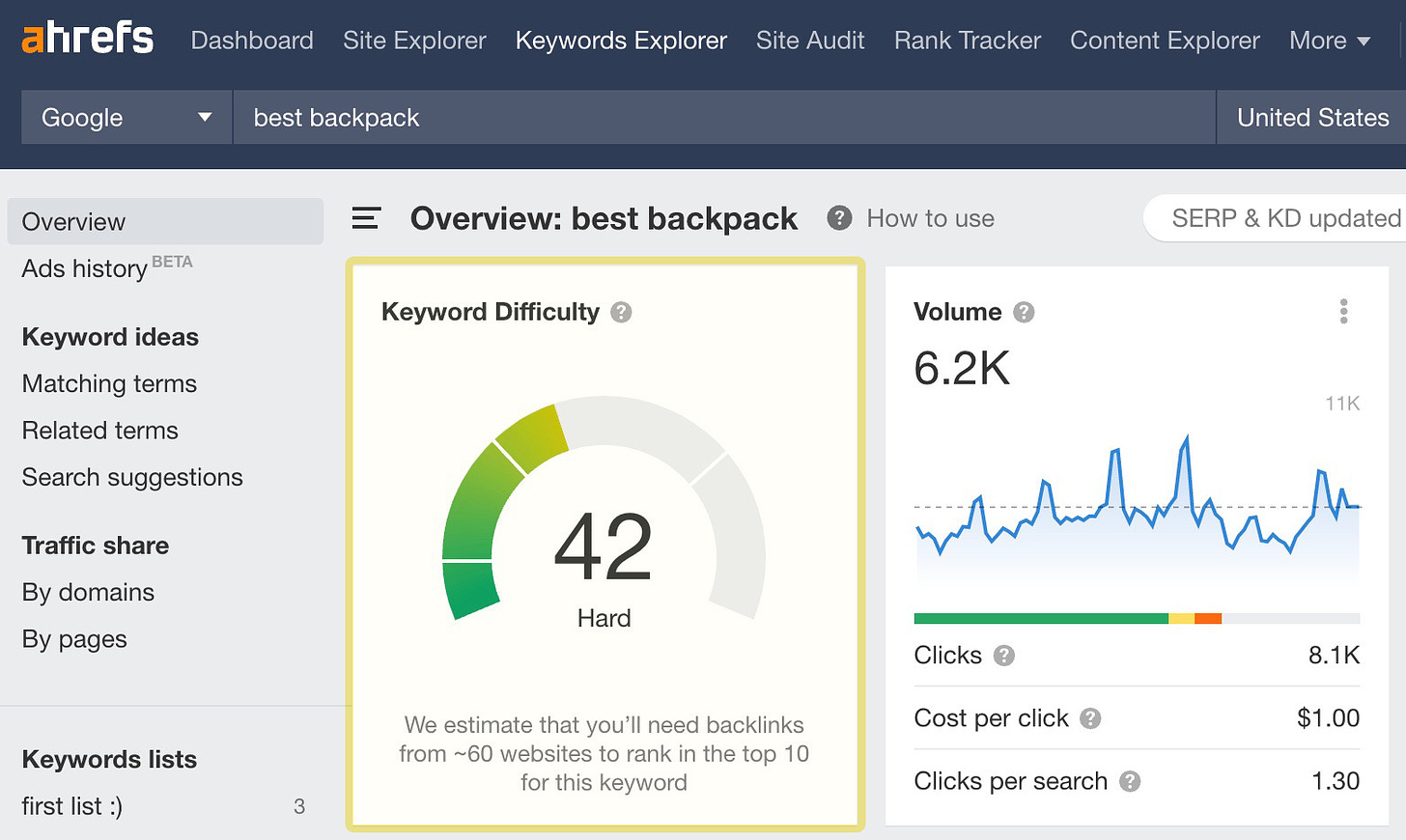

Thanks for this article! It’s really helpful and gives me a better understanding of keyword difficulty.